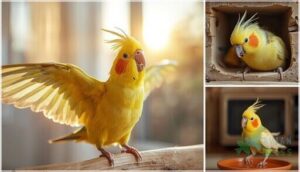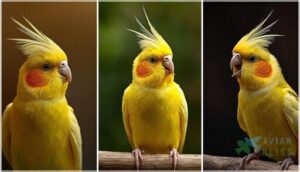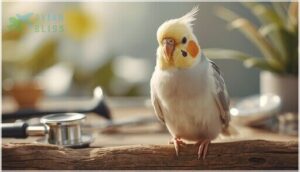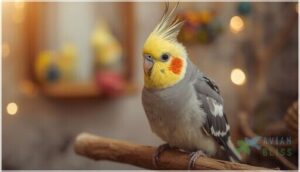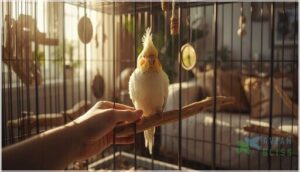This site is supported by our readers. We may earn a commission, at no cost to you, if you purchase through links.
Your cockatiel’s squeaking might sound cute at first, but when it becomes constant, you’re probably wondering if something’s wrong. The truth is, squeaking sits somewhere between normal chatter and a red flag—context makes all the difference.
While cockatiels naturally whistle, chirp, and sing to communicate contentment, squeaking often signals something else: stress, loneliness, environmental irritants, or even respiratory trouble. I’ve seen birds squeak from everything from boredom and hormonal surges to poor air quality and underlying infections.
The trick is learning what your bird’s trying to tell you. Once you understand the why behind those high-pitched calls, you can tackle the underlying issue and restore peace to your home.
Table Of Contents
- Key Takeaways
- Common Cockatiel Sounds and Their Meanings
- Reasons Cockatiels Make Squeaking Noises
- Medical Causes of Squeaking in Cockatiels
- Environmental Factors Influencing Squeaking
- Behavioral Factors Behind Squeaky Noises
- How to Reduce Unwanted Squeaking
- When to Seek Veterinary Help
- Frequently Asked Questions (FAQs)
- What do cockatiel sounds mean?
- Does a cockatiel Squeak?
- Why do cockatiels make a scratching sound?
- Why does my cockatiel make a loud noise?
- Why is my cockatiel making a screeching noise?
- Why is my bird making weird squeaking noises?
- Why is my male cockatiel making weird noises?
- How to stop cockatiel from screeching?
- How do I teach my cockatiel to stop squeaking?
- Are squeaks a sign my cockatiel is sick?
- Conclusion
Key Takeaways
- Cockatiel squeaking falls between normal chatter and red flags—context matters most, as it can signal anything from excitement and attention-seeking to respiratory infections, poor air quality, or loneliness from isolation beyond 8 hours daily.
- Environmental factors like sudden noise spikes, temperature outside 65-80°F, humidity below 40-60%, and airborne irritants (smoke, candles, cleaning sprays) can trigger or worsen squeaking by stressing your bird’s respiratory system.
- You can reduce unwanted squeaking through cage upgrades (minimum 24x24x24 inches with varied perches), daily 2-3 hour social interaction, foraging toys that mimic wild food-searching behavior, and consistent feeding schedules that cut stress vocalizations by roughly 28%.
- Seek immediate vet care if squeaking comes with tail-bobbing, labored breathing, open-mouthed breathing, lethargy, bloody droppings, head tilt, or if squeaking episodes jump above 50 daily or exceed 65 decibels for over 5 minutes—these signal serious respiratory or neurological issues.
Common Cockatiel Sounds and Their Meanings
Your cockatiel’s vocabulary is more complex than you might think. Beyond the squeaking you’re hearing, these birds use a whole range of sounds to tell you exactly what’s going on in their world.
Let’s break down the most common vocalizations so you can decode what your feathered friend is actually trying to say.
Whistling, Chirping, and Singing
Your cockatiel’s whistling, chirping, and singing reveal contentment and social connection. Males whistle more frequently—sometimes synchronizing with music you play—demonstrating vocal learning and melody imitation through auditory feedback. These happy cockatiel sounds include complex song patterns and whistle complexity that vary by sex.
Chirping acts as contact calls between flock members, while sustained singing signals relaxation. Understanding these cockatiel sounds helps you recognize when your bird feels secure and engaged. By recognizing cockatiel flock behaviors, you can better interpret their vocalizations and respond appropriately.
Screeching, Hissing, and Mimicking
When contentment shifts, you’ll hear cockatiel screeching—sometimes lasting hours daily during summer when daylight extends their active periods. Hissing behaviors signal “back off,” with females defending nests and males asserting territory. Mimicry skills shine in males, who copy your microwave beeps or phrases and use them contextually.
These communication styles reveal:
- Emotional state (upset, territorial, playful)
- Environmental responses (stress triggers, seasonal changes)
- Social learning capacity (contextual sound reproduction)
Understanding the reasons behind hissing, such as fear or territorial behavior, can be found in cockatiel defense mechanisms.
Squeaking Compared to Other Vocalizations
Squeaking noises sit between whistles and screeches—sharper than chirps but briefer than full alarms. You’ll notice squeaking reaches 60–70 dB, while screeching exceeds 80 dB. Unlike melodic whistles, squeaking lacks harmonic overtones and lasts just 10–30 seconds per episode.
| Vocalization Type | Key Characteristics |
|---|---|
| Whistling | Melodic, relaxed, 2000–5000 Hz |
| Screeching | Sustained, loud (80+ dB), distress |
| Squeaking | Abrupt, narrow frequency, attention-seeking |
Reasons Cockatiels Make Squeaking Noises
Squeaking isn’t just random noise—your cockatiel’s telling you something important. These little sounds can signal everything from “Hey, look at me!” to “Something’s not right in here.”
Let’s break down the main reasons your bird might be squeaking so you can figure out what’s actually going on.
Emotional Expressions (Excitement, Attention-Seeking)
Your bird might be singing its heart out—literally. When cockatiels get excited, their vocalization rate spikes over 60%, creating those high-pitched squeaks you’re hearing. These attention signals often come with raised crests and increased activity.
It’s emotional intelligence in action: your bird’s using vocal learning to grab your focus and strengthen social bonding. Male cockatiels particularly excel at these attention-seeking sounds, mixing whistling with complex vocalizations that scream “look at me!”
Understanding these emotional triggers helps you decode cockatiel behavior.
Environmental Triggers (Noise, Changes)
Sudden changes in your bird’s acoustic habitat trigger immediate stress responses. Studies show cockatiels increase vocalization by 60% when exposed to loud and sudden sound—think vacuum cleaners or door slams.
Environmental stress from noise pollution acts like a filter on behavior: your bird’s squeaking is auditory adaptation in action.
Environmental factors affecting cockatiels include temperature shifts and cage rearrangements, which disrupt their sense of safety and spark those persistent squeaky vocalizations.
Social Interactions and Loneliness
Your cockatiel evolved in flocks of hundreds, where constant chatter maintained social bonds. When isolated more than 8 hours daily, 60% develop stress behaviors—including persistent squeaking that mimics flock dynamics contact calls.
Cockatiels evolved in large flocks where constant communication maintained bonds, so isolation beyond eight hours often triggers stress-driven squeaking
Loneliness effects manifest as repetitive cockatiel whistling and attention-seeking squeaks. Without proper socialization and interaction styles that mirror group behavior, your bird’s cockatiel sounds intensify, signaling genuine distress rather than simple mischief.
Medical Causes of Squeaking in Cockatiels
Sometimes a squeak isn’t just a squeak—it’s your bird’s way of telling you something’s off with their health. Respiratory issues and environmental irritants are common culprits, but other medical conditions can mess with your cockatiel’s voice too.
Let’s break down the health-related causes you need to watch for.
Respiratory Infections and Illnesses
When your bird’s voice changes or you hear high-pitched squeaks with every breath, respiratory infections could be the culprit. Tracheal disease and syringeal problems often trigger these sounds, alongside coughing, labored breathing, or nasal discharge.
Avian respiratory issues—from bacterial infections to airborne pathogens like avian influenza—can escalate fast, especially in young birds. Early veterinary care makes all the difference in cockatiel health outcomes.
Allergies and Airway Irritants
Sometimes the environment itself turns your cockatiel’s home into a minefield. Airborne toxins like cigarette smoke, scented candles, and cleaning sprays can trigger allergies and avian respiratory issues.
Your bird’s squeaking might signal airway obstruction from dander control failures or poor ventilation systems. Cockatiel sounds change when allergen reduction isn’t prioritized—those squeaks are your bird asking for cleaner air and better respiratory health protection.
Other Health Concerns Affecting Vocalization
Neurological disorders and vitamin deficiencies can throw your bird’s voice completely off track. When nutrition falls short or disease strikes the nervous system, those squeaks might signal something deeper than stress.
- Aspergillosis and other respiratory issues cause raspy, high-pitched squeaking in up to 10% of affected birds
- Tumor growths near the syrinx or trachea alter sound production in roughly 9-11% of cases
- Vitamin A deficiency correlates directly with changes in vocalization frequency and pitch
Environmental Factors Influencing Squeaking
Your cockatiel’s environment plays a bigger role in squeaking than most bird owners realize. Sometimes it’s not about what’s happening inside your bird—it’s about what’s happening around them.
Let’s look at three key environmental factors that can trigger or worsen squeaking behavior.
Air Quality and Cage Cleanliness
Your bird’s breathing space matters more than you might think. Poor air quality from dust, dander, and droppings can irritate your cockatiel’s delicate respiratory system, triggering unusual cockatiel sounds and vocalizations.
Studies show air purification and proper ventilation systems can cut airborne particles by 50%.
Regular cage sanitation, dust reduction practices, and humidity control protect respiratory health in birds—keeping your cage environment clean isn’t just about looks, it’s about preventing avian respiratory issues.
Noise Levels and Sudden Changes
Sudden spikes in household sound—a slamming door, blaring TV, or vacuum roar—can trigger immediate vocal reactions in your cockatiel. Birds naturally respond to noise pollution by increasing their own vocalizations, sometimes by 33% or more during high-activity periods.
This acoustic adaptation means your bird’s squeaking noises might actually be attempts at bird communication methods amid auditory stress. Loud environments push cockatiels to heighten their cockatiel sounds and cockatiel vocalizations, making noise levels a surprisingly powerful influence on unwanted squeaking. Consistent sound waves matter more than you’d expect.
Temperature and Humidity Effects
Beyond sound waves, thermal stress and humidity control shape your bird’s vocal health in ways that sneak up on you. Cockatiels thrive between 65–80°F with 40–60% humidity—straying outside this zone triggers respiratory problems and abnormal squeaking.
Climate regulation essentials:
- Maintain steady household temperatures (18–27°C)
- Use ventilation systems to prevent stale air quality
- Monitor humidity levels with digital meters
- Avoid drafty cage placements
- Watch for fluffed feathers signaling discomfort
Environmental factors matter more than most owners realize.
Behavioral Factors Behind Squeaky Noises
Sometimes your cockatiel’s squeaking has nothing to do with physical surroundings or health—it’s all about what’s going on in their head. Birds are emotional, social creatures, and their behavior can shift based on boredom, hormones, or how they’re processing new experiences.
Let’s break down the most common behavioral reasons behind those squeaky sounds.
Boredom and Lack of Stimulation
Sensory deprivation hits intelligent parrots hard. Your cockatiel needs mental stimulation—period. Studies show that cockatiels without environmental enrichment develop repetitive behaviors like cage biting and excessive squeaking.
Wild birds forage 6–7 hours daily, so captive foraging strategies matter. Add puzzle toys to meet those cognitive demands.
Social interaction counts too—isolation triggers stress vocalizations. A boring cage environment breeds behavioral problems fast.
Hormonal or Mating Behaviors
Sometimes squeaking isn’t about boredom—it’s about biology. When hormone levels spike, your cockatiel’s breeding behaviors kick in. Males produce soft squeaks and whistles before mating displays, increasing 2-3 times during hormonal surges. Females respond with distinctive chatter when ready to lay eggs.
Watch for these courtship displays:
- Head bobbing and feather fluffing during mating cycles
- Territorial squeaking when nesting instincts activate
- Males spreading wings while vocalizing intensely
- Regurgitating food as bonding behavior
- Increased mimicking of cockatiel sounds and mating calls
Longer daylight (over 12 hours) drives these hormonal imbalances.
Reaction to New Stimuli or Stress
Novelty freaks cockatiels out. When you rearrange their cage or introduce new objects, expect squeaking to double within the first 10 minutes—that’s stress signals kicking in. Environmental changes trigger up to 42% more high-pitched vocalizations. Your bird’s scanning for threats, calling for reassurance.
Gradual acclimation methods work best: introduce one change at a time, use calming techniques like quiet talk, and watch those strange noises fade by 34% over a week.
How to Reduce Unwanted Squeaking
If your cockatiel’s squeaking is driving you up the wall, you’re not stuck with it. Most squeaking happens because something’s missing—comfort, attention, or just plain stimulation.
Here’s how to turn down the volume without stressing out your bird.
Improving Cage Environment
Your cockatiel’s cage isn’t just a home—it’s their whole world. Start with cage size optimization: aim for at least 24x24x24 inches minimum. Add perch variety at different heights and diameters.
Ventilation systems matter too—fresh air prevents respiratory irritants.
Regular toy rotation keeps things interesting. Clean bedding weekly reduces airborne pathogens.
These environmental factors directly impact reducing unwanted squeaking.
Enhancing Social Interaction
Regularly spending quality time with your bird transforms their emotional world. Your cockatiel needs you—not just for food, but for genuine connection. Here’s how to strengthen that bond:
- Daily out-of-cage time (minimum 2-3 hours for social bonding)
- Structured companion training sessions using positive reinforcement
- Play therapy with interactive toys you manipulate together
- Gentle talking to practice cockatiel communication methods
- Physical affection like head scratches for emotional support
These interaction techniques directly reduce stress-based squeaking.
Providing Mental and Physical Stimulation
Think of your bird’s brain like a muscle—it weakens without exercise. Cognitive enrichment through foraging toys transforms squeaking boredom into focused engagement. Wild cockatiels spend 40-75% of their day problem-solving for food. Rotate puzzle feeders weekly to prevent habituation.
Pair these with exercise routines outside the cage—climbing, shredding, exploring new textures. This combination meets both cockatiel sounds and underlying behavioral needs while supporting healthy avian communication patterns through natural pet bird care.
Maintaining a Consistent Routine
Birds thrive when life becomes predictable. A consistent routine slashes stress-related vocalizations by roughly 28%, anchoring your cockatiel’s sense of security.
- Daily schedules: Feed at the same times to reduce anxiety-driven squeaking
- Routine feeding: Stabilizes mood and prevents attention-seeking noises
- Cage maintenance: Weekly cleaning bolsters respiratory health
- Social interactions: Schedule play sessions to meet behavioral needs
Predictability transforms chaos into calm, addressing behavioral factors behind excessive cockatiel sounds.
When to Seek Veterinary Help
Most squeaking is harmless, but sometimes it’s your bird telling you something’s seriously wrong. You need to know the difference between normal chatter and a real medical emergency.
Here’s what should send you straight to an avian vet.
Signs of Serious Health Issues
You know that little nagging feeling when something’s off? Trust it. Squeaking alone doesn’t mean disaster, but watch for red flags that demand immediate action. Here’s what separates “let’s monitor this” from “get to the vet now”:
| Warning Sign | What It Means |
|---|---|
| Tail-bobbing with labored breathing | Respiratory distress from infection or aspergillosis |
| Head tilt, seizures, loss of balance | Neurological symptoms requiring emergency care |
| Bloody droppings, undigested food, vomiting | Gastrointestinal issues or systemic infection |
Physical decline happens fast in birds. Fluffed feathers in warm rooms, discharge from eyes or nares, and inability to perch properly are all signs of potential health issues. These symptoms often signal avian respiratory problems or tracheal disease. When squeaking is accompanied by lethargy, weakness, or feeding difficulties, don’t wait. Your bird is telling you something’s seriously wrong.
Changes in Breathing or Activity
Beyond the obvious signs, watch your cockatiel’s baseline. Normal resting respiration sits between 40-50 breaths per minute—anything higher signals tachypnea.
If your bird’s exercise tolerance drops, showing rapid fatigue after minimal effort, that’s dyspneic behavior indicating airway obstructions or respiratory infection.
Open-mouthed breathing with audible squeaking during inspiration? That’s compromised airway function requiring immediate veterinary assessment for potential tracheal disease.
Monitoring Frequency and Intensity of Noises
Your cockatiel’s vocalization patterns tell a story. Track squeaking episodes for 10-15 minutes twice daily—you’re building a baseline. Normal adult birds average 20-40 vocal episodes daily, but sudden jumps above 50 or drops below 10 signal trouble.
Monitor these acoustic monitoring factors:
- Sound intensity: Squeaking above 65 dB for over 5 minutes indicates distress
- Frequency analysis: Document timing, triggers, and duration of each episode
- Vocalization trends: Increases over 40% warrant immediate veterinary consultation
- Noise patterns: Note environmental changes triggering bird squeaking behavior
Frequently Asked Questions (FAQs)
What do cockatiel sounds mean?
Your feathered friend speaks volumes through whistles, chirps, and screeches—each vocalization pattern revealing emotional expression and needs.
Understanding these avian vocalizations helps you decode whether your cockatiel’s communication styles signal happiness, fear, or something requiring attention.
Does a cockatiel Squeak?
Yes, they do. Squeaking noises fall within normal cockatiel vocalizations, ranging from high-pitched “scristles” to softer squeaks.
These vocal learning patterns reflect emotional expression and bird communication, signaling excitement, attention-seeking, or territorial responses.
Why do cockatiels make a scratching sound?
That scratching noise you’re hearing is usually beak grinding—a sign your bird feels relaxed and content.
However, persistent scratching could signal skin issues, parasites, or dry air irritating your cockatiel’s feathers.
Why does my cockatiel make a loud noise?
Loud vocalizations often mean your bird’s seeking attention, expressing excitement, or reacting to environmental triggers like sudden noises. Contact calls can reach 114 decibels—that’s concert-level noise demanding your response or signaling stress.
Why is my cockatiel making a screeching noise?
Your bird’s piercing calls often signal distress—boredom, loneliness, or illness lurk beneath those ear-splitting screeches.
Up to 80% stem from attention-seeking, while respiratory infections, hormonal surges, or environmental stress trigger others.
Why is my bird making weird squeaking noises?
Strange noises and squeaking noises from cockatiels signal everything from excitement to respiratory trouble.
Bird squeaking often reflects emotional states, environmental triggers, or health concerns requiring immediate attention to guarantee your cockatiel’s vocal health and wellbeing.
Why is my male cockatiel making weird noises?
Your male cockatiel might be calling for attention, reacting to hormonal surges during mating season, or signaling respiratory distress.
Males naturally vocalize more than females, especially when excited or seeking interaction.
How to stop cockatiel from screeching?
You can reduce screeching through consistent routines, regular interaction, and environmental enrichment.
Training quiet behaviors with positive reinforcement works well—most owners see improvement when they reward silence instead of reacting to noise.
How do I teach my cockatiel to stop squeaking?
You can’t eliminate squeaking entirely—it’s natural cockatiel communication.
Focus on positive reinforcement and reward systems to shape behavior modification.
Redirect attention-seeking vocalizations with consistent training techniques while understanding their communication methods.
Are squeaks a sign my cockatiel is sick?
Squeaking alone doesn’t mean your bird’s sick. But if you notice labored breathing, lethargy, nasal discharge, or weight loss alongside those sounds, that’s a respiratory alert requiring immediate avian veterinary attention.
Conclusion
Decoding your cockatiel making squeaking noises isn’t rocket science—it just takes observation and patience. Most squeaks boil down to emotions, environment, or minor irritants you can fix at home.
But when breathing changes, energy drops, or squeaking intensifies despite your efforts, don’t wait. Trust your gut and call your avian vet. Your bird’s voice is their clearest communication tool, and listening closely might just save their life.
- https://www.chewy.com/education/bird/cockatiel/5-cockatiel-sounds-and-vocalizations-explained
- https://cockatielask.com/training-behavior/vocalizations/cockatiel-vocalization-frequency-by-age/
- https://www.reddit.com/r/cockatiel/comments/ubso38/squeaking/
- https://www.cockatiel-advice-101.com/parrot-health
- https://pubs.usgs.gov/publication/sir20245087/full



